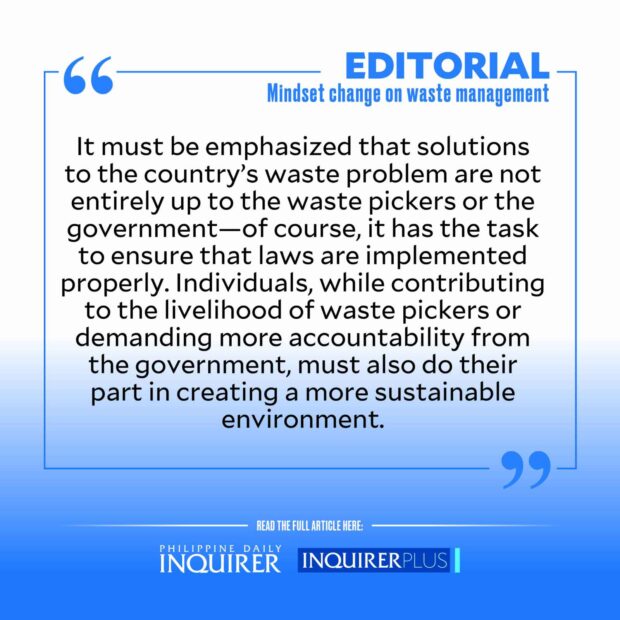Mindset change on waste management

Waste segregation is a task that should start at the household level but is something that majority of Filipinos either find too laborious or never learned to do. That task has mostly fallen on waste pickers (locally known as “mangangalakal”), who go around neighborhoods looking for “diyaryo, bote, garapa” or go through garbage at the dump sites to find scraps they could sell.
Environment Secretary Ma. Antonia Yulo-Loyzaga’s proposal this week to integrate informal workers into the expanded producer responsibility or EPR system is a recognition of their important role in managing the trash that the country produces on a daily basis and can help improve waste collection as the country shifts to a circular economy.
“It’s very important to realize that without this particular sector, the whole collection system would not work,” said Loyzaga.
This initiative will need the cooperation of local government units (LGUs) and the social welfare department and should be pursued to complement efforts in reducing waste.
The Philippines produces over one-third of all oceanic plastic waste in the world, mainly due to the lack of access of at least 70 percent of the population to disposal facilities and sanitary landfills. While it has enough laws to address the waste problem, including Republic Act No. 9003 or the Ecological Solid Waste Management Act of 2000, the Commission on Audit (COA) in its April performance audit report of the government’s waste management program released last month, observed a “steady increase” in solid waste generation in the country through the years.
COA projected that annual solid waste production will increase further in the following decades: from 16.63 million metric tons in 2020 to 19.76 million metric tons in 2030, and to 24.50 million metric tons in 2045.
The COA report also said that RA 9003 “may not be seen as progressively achieving its goals” since its implementation two decades ago. Aside from the law’s inconsistent implementation in waste segregation such that mixed wastes have been found in landfills, environmental officials also pointed to the lack of discipline among Filipinos.
“We just throw away our waste [anywhere], [there is also no] segregation. It’s a total mindset change for solid waste management,” said Department of Science and Technology Undersecretary for research and development Leah Buendia.
This mindset change would entail a massive information and education campaign on sustainable consumption and lifestyle—something that a developing country like the Philippines may find difficult to attain when people’s consumption habits are still largely influenced by developed countries that have more advanced waste disposal facilities.
But it is not altogether impossible since recycling household waste is not an entirely new concept here: old clothes are recycled as rags and leftover food is given to animals or used for composting. These already existing practices can be taken a step further: clothes and other materials can be upcycled, which is already being done by some local brands; and leftovers can be recycled into biogas, animal feed, or fertilizer like what South Korea has been doing since 2005. That country now recycles nearly 100 percent of its food waste with municipalities introducing automated food waste collectors in apartment complexes.
These are areas that the Philippine government can look into given the country’s staggeringly high amount of food waste: a 2021 study by the United Nations Environment Programme said households generate some 9.4 million tons of food waste, an irony when there are millions of hungry Filipinos. As of last year, only two LGUs — Marikina and Muntinlupa — have been known to establish a system that processes food waste into other by-products.
It must be emphasized that solutions to the country’s waste problem are not entirely up to the waste pickers or the government—of course, it has the task to ensure that laws are implemented properly. Individuals, while contributing to the livelihood of waste pickers or demanding more accountability from the government, must also do their part in creating a more sustainable environment.
Japan, which produces a lot of plastic waste — mostly from food packaging and disposable items like plastic umbrellas and chopsticks — has put in place a detailed sorting and waste collection system that is taught in school and practiced at home. It is common to see four to five bins for different types of waste: combustible, plastic, cardboard, glass, cans. Collection points and recycling bins are accessible at supermarkets, drugstores, shops, etc. and the habit of sorting waste has been deeply ingrained into their psyche.
The country’s mounting waste problem requires every Filipino to do even simple tasks like disposing of garbage properly and not throwing them anywhere or the practice of sorting, reusing, and recycling. It goes back to our values of being “masinop” (frugal) and “malinis” (clean), and applying these in how we manage our waste. It’s all a matter of mindset.




















